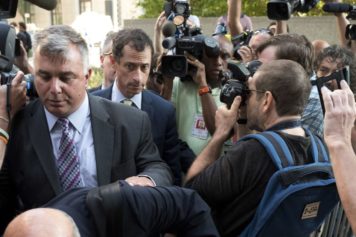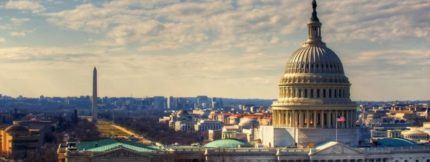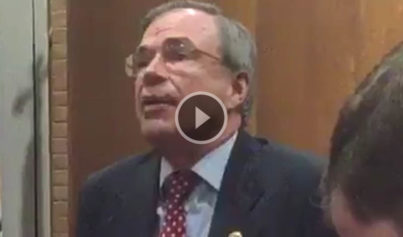As the public watches the ongoing comeback stories of politicians like Anthony Weiner, Eliot Spitzer and Mark Sanford, former Washington, DC mayor Marion Barry re-appeared on the national scene this weekend to offer his expertise on the elements needed to survive a political scandal.
“I identify with the fallen, whoever they may be,” Barry told The Daily Beast during a weekend visit to New York to appear on Melissa Harris-Perry’s MSNBC show. “Everybody, at some point in life, is gonna get knocked down.”
Barry’s infamy stemmed from his conviction 22 years ago of cocaine possession when he was caught on an FBI video sucking on a crack pipe, then referenced the former girlfriend who engineered his capture, “Bitch set me up.” But since those days, Barry, who says he has been clean for 20 years, was re-elected mayor and is currently a popular DC councilman for Ward 8. Even though he recently was censured and fined $13,600 for accepting $6,800 in gifts from city contractors, Barry is still enormously popular—with an 81 percent approval rating among African-Americans.
“I don’t care who you are, how rich you are, how poor you are,” Barry said. “A divorce might pull you down. Drugs may pull you down. Kids who are out of control may pull you down. A serious death in your family. What I say to people is, if you fall down, fall down on your back. Then you can look up. If you can look up, you can get up. And if you can get up, you can go up.”
But on MSNBC on Saturday, Barry said Spitzer—who had prosecuted a prostitution ring as attorney general before being caught as governor patronizing call girls himself—was possibly guilty of “hypocrisy.”
“I have respect if they are truly contrite, if they’re truly sorry about what they did, if they’re humble about it, that the political ‘game’ is not a game, that it’s an honest comeback from hell into another kind of situation,” he said.
Barry said the ways of the media have changed so much since he entered politics four decades ago—a Mississippi native who picked cotton as a teenager and went on to obtain his master’s degree in chemistry before working as a leader in the civil rights movement and then winning a seat on the D.C. school board. “When I was mayor for 16 years and did other things, it was fun,” he said. “You got a lot done. Now it’s hell being a politician. The press is unscrupulous. The press looks for the negative.”
Some observers wonder whether the American public has now gotten more forgiving of politicians who have been embroiled in scandals—as Weiner runs for New York mayor and Spitzer runs for New York comptroller after their own sex scandals.
Boston Globe columnist Joanna Weiss wrote that it was about the candidates’ authenticity, more than voters being willing to forgive and forget.
“Voters, on the whole, tend to think more strategically than that,” Weiss wrote. “They choose politicians on their relative merits, and they choose which scandals to overlook. Barney Frank didn’t weather bad news because of the public’s benevolence; he kept winning because voters in his district understood who he was, and wanted precisely that guy in office.”
Of Hillary Clinton, she wrote: “No one was buying her, decades ago, as a blandly supportive political wife who really enjoyed baking cookies. But as a hyper-ambitious, hyper-competent woman who wouldn’t let embarrassment bring her down? That’s a politician people can believe in.”
Barry is in the midst of a political battle in Washington over the fate of Wal-Mart. Barry voted on the council to raise the district’s minimum wage for large retailers–a move that now throws complicates Wal-Mart’s plans to open its doors in the nation’s capital.
“What really tipped me over the edge was the fact that Wal-Mart was sticking us up. By saying if you don’t do this, we’re going to do that–we’re going to leave here,” Barry said last week.
The bill, called the Large Retailer Accountability Act, requires big retailers to pay a minimum wage of $12.50, which is a rise of 50 percent above the city’s current minimum wage, already a dollar more than the minimum wage in neighboring Virginia and Maryland.
Wal-Mart said the bill would create “an uneven playing field” and “challenge the fiscal health of our planned D.C. stores.” A spokesman for the company said the bill would cause Wal-Mart to halt construction on three of the six stores planned for the city—two stores are already scheduled to open this fall. The company says the stores would create 1,800 jobs and bring more affordable products to underserved communities.
“This was a difficult decision for us…but the council has forced our hand,” the Wal-Mart spokesman told CNN. “Our wages and benefits meet or exceed those offered by most of our competitors.”
But Barry said he wasn’t accepting ultimatums.
“You don’t get a job at any price,” he said. “They have held us hostage, we’re not going to take it.”
But Democratic Mayor Vincent Gray, in addition to the Washington Post editorial board, have been supportive of Wal-Mart’s efforts, claiming the economic development would be a net win for the city.
Barry, whose memoirs are scheduled to be published next year by Simon & Schuster, said he finds comfort and solace in the black community, which he insists is “more forgiving” than other ethnic groups.
“Studies have shown that, and other things have shown that, based on our spiritual past,” he told The Daily Beast. “I know that to be a fact. We are a forgiving people. People can kick your ass and still sometimes you want to forgive them.”


